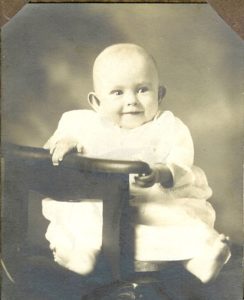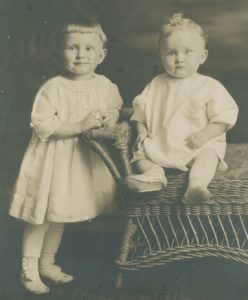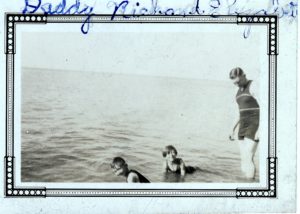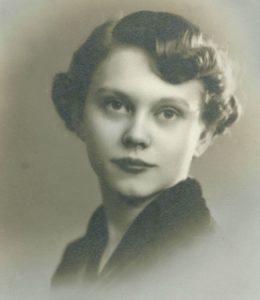Elizabeth Denman Salt (1919-1991) – 52 Ancestors # 19, Mother’s Day
Since Mother’s Day was last weekend in the United States, and I’m still running behind in the 52 Ancestors challenge to myself, I am focusing on my mother, Elizabeth Denman Salt. Elizabeth was the first child of Lyle Denman and Bricena Snow. She was born in June 1919 in Lorain, Ohio. World War I (as it came to be called) had ended in the previous November, and my grandfather had been discharged from his military service in December. Lyle and Bricena set up housekeeping in Lorain and he went to work for a bank there as a teller.
She was born in June 1919 in Lorain, Ohio. World War I (as it came to be called) had ended in the previous November, and my grandfather had been discharged from his military service in December. Lyle and Bricena set up housekeeping in Lorain and he went to work for a bank there as a teller.  Her brother Richard was born 15 months later.
Her brother Richard was born 15 months later.
For most of my mother’s childhood, however, her father did outside sales for the Hammond meatpacking company which was in Chicago, with various territories in Ohio. He was centered in Canton, Ohio for all of her school years, which I have written about before.
In the memoir my mother started writing at the end of her life, she described her growing up in Ohio and her family life in some detail. She and her only brother were close and spent a lot of time playing together with various neighborhood children. My grandparents, Lyle and Cena Denman, also made it a point to spend time with their children. My mother described it: “These years, from the time I was between nine and ten and the time I went to college were the years the four of us spent a great many happy Sundays together. We still visited Wakeman, but not so often. Instead, Dick & I were dropped off at Sunday School while Mother and Dad prepared to go on a family outing. I don’t know about Dick but I remember telling some of my friends that I couldn’t do something with them because the family had plans. I really preferred the family outing.”
On the Sunday outings there was a ride in the car and often fishing and a picnic in a spot my grandfather had seen on his work travels, or swimming. Sometimes they would go to a state or municipal park, sometimes to an indoor venue if the weather was particularly bad. This was the kind of family activity that my parents replicated with their own children. We too took Sunday car rides, went fishing, and for years went to the community pool as a family on Sunday afternoons. We also visited the public library weekly with our mother, just as she had with as a child with her parents.
Sunday outings there was a ride in the car and often fishing and a picnic in a spot my grandfather had seen on his work travels, or swimming. Sometimes they would go to a state or municipal park, sometimes to an indoor venue if the weather was particularly bad. This was the kind of family activity that my parents replicated with their own children. We too took Sunday car rides, went fishing, and for years went to the community pool as a family on Sunday afternoons. We also visited the public library weekly with our mother, just as she had with as a child with her parents.
The summer after she graduated from high school, in 1936 (having skipped a grade in elementary school), she worked for a summer camp and then went to work at the local J.C. Penney store.starting part-time and then full time around the Christmas season. The money she earned was used to get her clothing ready for college as her father worked to earn the money for her to go. After being let go at J.C. Penney after the Christmas season, she managed to find a job doing piece work in a small fishing fly tying business run by one of the local teachers in his basement. She learned how to tie all sorts of different flies and the names of some of the specialty ones, which I always thought was pretty cool for a mom.
Elizabeth had been a Girl Scout from the time she discovered the program at about age 12, loving the outdoors and physical activity as well as the companionship of the other girls. In the summer of 1937 she was named by the local Council to attend the big World Encampment in August celebrating their 25th anniversary.  Girls represented each state and Girl Scout region as well as each of 26-30 foreign countries where there was Scouting. It took place at a camp in Briarcliff Manor in New York, about 30 miles north of New York City. This was a big deal and got its share of national press coverage, partly because of the adults involved, including being welcomed by Mrs. Herbert Hoover who was head of the National Board and then an address by Mrs. Franklin D. Roosevelt. She was just 18 years old. This would have been the first time Elizabeth had traveled alone for any distance, as she took a bus from Canton to New York City and then, meeting others at Grand Central they took a train and bus to Briarcliff and the camp.
Girls represented each state and Girl Scout region as well as each of 26-30 foreign countries where there was Scouting. It took place at a camp in Briarcliff Manor in New York, about 30 miles north of New York City. This was a big deal and got its share of national press coverage, partly because of the adults involved, including being welcomed by Mrs. Herbert Hoover who was head of the National Board and then an address by Mrs. Franklin D. Roosevelt. She was just 18 years old. This would have been the first time Elizabeth had traveled alone for any distance, as she took a bus from Canton to New York City and then, meeting others at Grand Central they took a train and bus to Briarcliff and the camp.
This 3-week experience was a formative one, I think, for my mother. She described it as a magical experience. Fifty years after that encampment, she participated in planning and attending a reunion of as many of the original participants as they could find.
Each tent of 4-5 Scouts included one of the foreign Scouts or Guides and Elizabeth’s included the girl from Romania (apparently decided by language: two of the U.S, Scouts spoke a little French as did the Scout from Romania). There were many activities and of course lots of talking – they planted an avenue of trees, as well as cooking, sharing different foods and skills, canoeing, singing, etc. This was when my mom started to learn to knit. At the end of the time, she had to leave immediately to get back to Ohio in time for her first year at Antioch College. She did, however, manage a couple of days in New York City with her family, sightseeing.
At Antioch, my mother finally managed to change what people called her, known to all as Denny from her college days on. She had always disliked all of the usual nicknames for Elizabeth, which people insisted on trying to use for her, and in his younger days her father had been known as Denny, so she adopted it. In the Life Aims paper required of all freshmen at Antioch, she wrote about the values she had acquired from her upbringing and her parents: She was interested in many things since her parents objected to people being bored or blase about life. They expected both of their children to always do the best they could in any endeavor, to work hard, and to get a good education. They had interests that they passed along to their children including the already noted drives, fishing and picnics. They also passed along a love of reading and an appreciation of good music, which my mother continued her whole life and passed along to her own children.

Leave a Reply